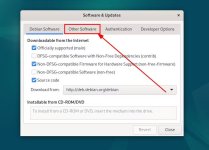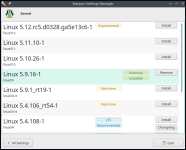Advice Request Manjaro & vpn
- Thread starter simmerskool
- Start date
You are using an out of date browser. It may not display this or other websites correctly.
You should upgrade or use an alternative browser.
You should upgrade or use an alternative browser.
Please provide comments and solutions that are helpful to the author of this topic.
I also find Manjaro nicely stable, but lately as I update my past life linux experience, several distros seem stable here in VMware 17.6.1. Running FreeBSD the past 2 days, and it is smoothing out nicely. Perhaps a little more work needed out of the box, but that's what I wanted...Not codec related but a known issue. And to be honest, i always miss Manjaro because its the only distro thats stable and runs smooth for me
I am starting to think linux garbled audio is not codecs but hardware -- I don't have speakers but I do use headphones and wondering if there's special special audio files needed for them although win10 has no problems with my headphones. More testing tomorrow.Probably driver/codec related issue as eluded by @lokamoka820. I never had such issue in my main PC or VM. openSUSE is a distro that is almost ready out of the box except codecs similar to Fedora for example.
You need to do this for codecs in openSUSE,
The audio issue that you experienced on Debian happens for me on some other distros also in a vm like Arch or something Arch based like EndeavourOS and also Fedora and openSUSE Tumbleweed, I think. I needed to install codecs for those specific distros. I also use headphones (earphones to be exact).I am starting to think linux garbled audio is not codecs but hardware -- I don't have speakers but I do use headphones and wondering if there's special special audio files needed for them although win10 has no problems with my headphones. More testing tomorrow.
Running Fedora 40 since last night. Wow very nice! but briefly heard some garbbled audio, but too jammed up for next few hours to test it various ways...The audio issue that you experienced on Debian happens for me on some other distros also in a vm like Arch or something Arch based like EndeavourOS and also Fedora and openSUSE Tumbleweed, I think. I needed to install codecs for those specific distros. I also use headphones (earphones to be exact).
I stop with Rolling Distro, went to :Running Fedora 40 since last night. Wow very nice! but briefly heard some garbbled audio, but too jammed up for next few hours to test it various ways...

Advanced Security - TuxTalk - Ubuntu 24.04 LTS Configuration
What a journey! Manjaro was doing so well, untill it locked me out of the SU inlog, meaning no Password was working anymore. System restore has not run yet so no way to restore, and to restore, yes, need the SU Password ! Reading on the Manjaro forum no luck, no option to reset or change...
 malwaretips.com
malwaretips.com
For codecs in Fedora follow these two pages one after another:Running Fedora 40 since last night. Wow very nice! but briefly heard some garbbled audio, but too jammed up for next few hours to test it various ways...
Ubuntu is my other Gnome distro. I did not use U that much but it seemed very good, but comparing 2 days with Ubuntu with 2 days of Fedora, I'm liking Fedora better. Debian also good but seemed a tad "limited" with software, but I'm not looking to install & run lots of software. I like SELinux on fedora as I used to run CentOS (ages ago). Fedora seems to have SELinux and firejail correctly configured default out of the box.I stop with Rolling Distro, went to :

Advanced Security - TuxTalk - Ubuntu 24.04 LTS Configuration
What a journey! Manjaro was doing so well, untill it locked me out of the SU inlog, meaning no Password was working anymore. System restore has not run yet so no way to restore, and to restore, yes, need the SU Password ! Reading on the Manjaro forum no luck, no option to reset or change...malwaretips.com
At first yes untill I encountered issues I never had with Ubuntu. I hope they will not pop up on your Fedora.Ubuntu is my other Gnome distro. I did not use U that much but it seemed very good, but comparing 2 days with Ubuntu with 2 days of Fedora, I'm liking Fedora better. Debian also good but seemed a tad "limited" with software, but I'm not looking to install & run lots of software. I like SELinux on fedora as I used to run CentOS (ages ago). Fedora seems to have SELinux and firejail correctly configured default out of the box.
Great security out of the boxI like SELinux on fedora as I used to run CentOS (ages ago). Fedora seems to have SELinux and firejail correctly configured default out of the box.
Consider doing adding these two lines in, "/etc/dnf/dnf.conf"
defaultyes=True
max_parallel_downloads=10
Last edited:
True, but for me not anymore, i just need a stable system, apparmor and i hardened the system. Runs perfect,Great security out of the boxThe main reason I tend to opt for rolling release is because of updates of apps. If I get problems on Arch/Tumbleweed then I would use Fedora as the packages are updated enough and it's stable.
Consider doing adding these two lines on, "/etc/dnf/dnf.conf"
Smooth like butter and secure.
well if I have anything to do about it, I'm sure they'll popup sooner or laterAt first yes untill I encountered issues I never had with Ubuntu. I hope they will not pop up on your Fedora.
Last edited:
Well, most non-rolling distros are stable especially the ones like Debian, Ubuntu and other distros based on them. Fedora is updated more than Ubuntu but less than Arch/Tumbleweed. It's at a nice balanced point between both worlds but in theory would be less stable than Ubuntu. Kernels are regularly updated on Fedora and new kernels have security and performance enhancements.True, but for me not anymore, i just need a stable system, apparmor and i hardened the system. Runs perfect,
Smooth like butter and secure.
Also apparently, SE Linux which Fedora uses provides more security than AppArmor but both are great. Arch for example don't have either but setting up AppArmor with recommended policies is not too difficult.
today I have 5 nix in VMware, I will probably cut it down to 2 eventually. If I had to pick today, I'm thinking Manjaro w/xfce4 and Fedora w/gnome. But nothing final about that...True, but for me not anymore, i just need a stable system, apparmor and i hardened the system. Runs perfect,
Smooth like butter and secure.
Fedora is RedHats playground for testing.Well, most non-rolling distros are stable especially the ones like Debian, Ubuntu and other distros based on them. Fedora is updated more than Ubuntu but less than Arch/Tumbleweed. It's at a nice balanced point between both worlds but in theory would be less stable than Ubuntu. Kernels are regularly updated on Fedora and new kernels have security and performance enhancements.
Also apparently, SE Linux which Fedora uses provides more security than AppArmor but both are great. Arch for example don't have either but setting up AppArmor with recommended policies is not too difficult.
Well @simmerskool, if you're going to have an "F" so am Itoday I have 5 nix in VMware, I will probably cut it down to 2 eventually. If I had to pick today, I'm thinking Manjaro w/xfce4 and Fedora w/gnome. But nothing final about that...
Fedora is RedHats playground for testing.
I know and being backed by RedHat means it is always going to be developed at a solid pace. Ubuntu non-lts versions are kind of the playground for Ubuntu LTS which in turn is based on Debain. openSUSE is kind of the playground for Suse Linux though they don't actually control it. It's like 70% independent.
Some fully independent distros would be Debian, Arch, Nix, Gentoo, Alpine, Void, etc.
Last edited:
Debian repos are not configured too, this is why it is limited in software, you need to enable "contrib" and "non-free" repos in software and updates app:Ubuntu is my other Gnome distro. I did not use U that much but it seemed very good, but comparing 2 days with Ubuntu with 2 days of Fedora, I'm liking Fedora better. Debian also good but seemed a tad "limited" with software, but I'm not looking to install & run lots of software. I like SELinux on fedora as I used to run CentOS (ages ago). Fedora seems to have SELinux and firejail correctly configured default out of the box.

Ubuntu have an LTS release and regular release, the LTS gets updates every 2 years and the regular every 6 months like fedora. Debian have 3 branches: stable, testing and Sid, so you can get updates depending on the branch you choose, and there is SparkyLinux which is based on Debian and have 2 editions: stable and semi-rolling, the semi-rolling is based on Debian testing but what is interesting about it that it gets stable updates daily, and complete tested snapshot update every 3 months, which will make it fresh and more stable than Debian testing itself.Well, most non-rolling distros are stable especially the ones like Debian, Ubuntu and other distros based on them. Fedora is updated more than Ubuntu but less than Arch/Tumbleweed. It's at a nice balanced point between both worlds but in theory would be less stable than Ubuntu. Kernels are regularly updated on Fedora and new kernels have security and performance enhancements.
Also apparently, SE Linux which Fedora uses provides more security than AppArmor but both are great. Arch for example don't have either but setting up AppArmor with recommended policies is not too difficult.
And you maybe know this about kernels, there are LTS and normal versions too. LTS kernels are more stable than normal, I think you will need to use a normal release kernel if you have a new machine that LTS kernel doesn't work on it, in Manjaro settings manager it will show you detailed information about kernels available and the recommended one.

You may also like...
-
-
Mullvad VPN Warns About Traffic Leaks on Latest macOS Sequoia
- Started by enaph
- Replies: 0
-
Advice Request re-task 2018 mac mini
- Started by simmerskool
- Replies: 8
-

